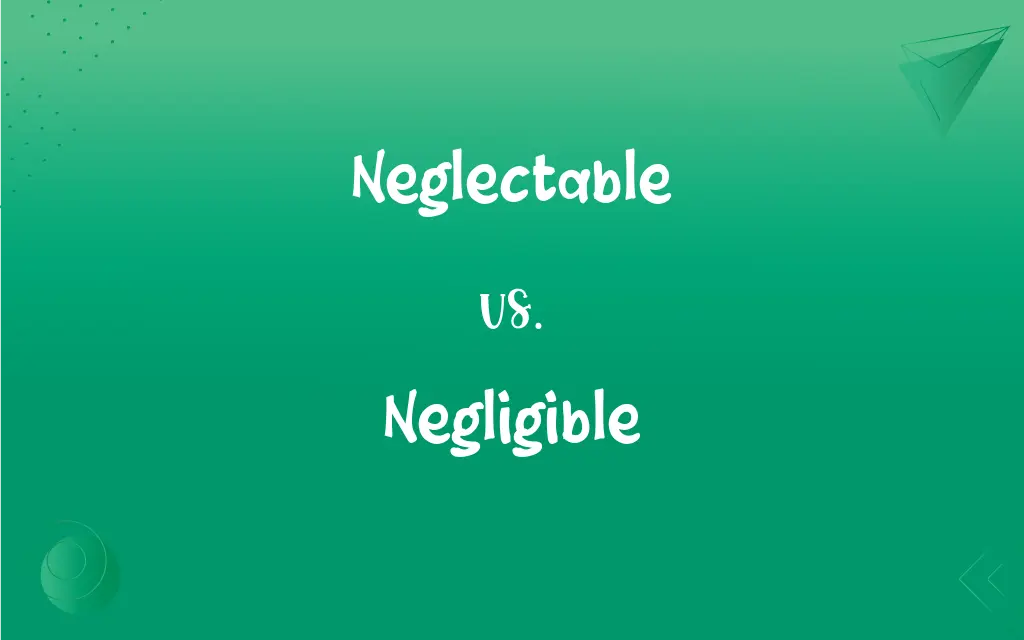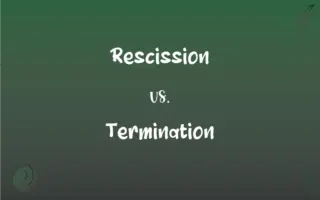Neglectable vs. Negligible: What's the Difference?
By Aimie Carlson || Updated on May 29, 2024
"Neglectable" means capable of being neglected without significant consequence, while "negligible" refers to something so small or unimportant that it can be safely ignored.

Key Differences
"Neglectable" describes something that can be disregarded without causing significant harm or effect. For example, minor tasks or details in a large project may be considered neglectable if they don't impact the overall outcome. This term implies a capability or possibility of being neglected. On the other hand, "negligible" means that something is so insignificant or minor that it does not require attention. For instance, a negligible amount of dust on a shelf is so small that cleaning it isn't necessary. This term emphasizes the triviality or unimportance of the thing in question.
In usage, "neglectable" often appears in contexts where the potential to overlook something is considered, especially when discussing tasks or factors that can be omitted. This term focuses more on the action of neglect. Conversely, "negligible" is used to highlight the minimal impact or importance of something. It often appears in contexts involving measurements or assessments where the insignificance is being quantified. The term underlines the minor nature of the item or issue.
"Neglectable" might imply that some judgment is involved in deciding to neglect the thing, based on its perceived importance or priority. This judgment is more about the decision-making process. Whereas "negligible" implies an inherent quality of being unimportant or minor, with little need for subjective judgment. The focus is on the objective insignificance of the item or issue.
Comparison Chart
Meaning
Capable of being neglected
So small/unimportant as to be ignored
Usage Context
Tasks, factors, decisions
Measurements, assessments
ADVERTISEMENT
Focus
Potential to neglect
Insignificance
Judgment
Involves subjective judgment
Objective triviality
Example
Minor task in a project
Tiny amount of dust
Neglectable and Negligible Definitions
Neglectable
Small enough to be overlooked in certain contexts.
The differences between the two versions are neglectable.
Negligible
So small or unimportant as to be not worth considering.
The cost increase was negligible and didn’t affect the budget.
ADVERTISEMENT
Neglectable
Not requiring attention due to low impact.
Neglectable details were omitted from the presentation.
Negligible
Having little or no impact.
The noise level was negligible and didn’t disturb the meeting.
Neglectable
Capable of being neglected without significant consequence.
The typo in the draft is neglectable and won’t affect the report.
Negligible
Insignificant in size or amount.
The error margin is negligible in this experiment.
Neglectable
Able to be disregarded in decision-making.
Some steps in the process are neglectable for efficiency.
Negligible
Practically insignificant.
The temperature change was negligible over the day.
Neglectable
Considered unimportant in specific scenarios.
Minor software bugs were neglectable for the release.
Negligible
Not warranting attention or concern.
The effect of the policy change is negligible.
Neglectable
Small enough or unimportant enough to be neglected; negligible.
Negligible
Not significant or important enough to be worth considering; trifling.
Negligible
Able to be neglected, ignored or excluded from consideration; too small or unimportant to be of concern.
We found errors, but their effects were negligible.
Negligible
That may be neglected, disregarded, or left out of consideration; too small or unimportant to be worthy of notice.
Within very negligible limits of error.
Negligible
So small as to be meaningless; insignificant;
The effect was negligible
Negligible
Not worth considering;
He considered the prize too paltry for the lives it must cost
Piffling efforts
A trifling matter
FAQs
What does "negligible" mean?
"Negligible" means so small or unimportant that it can be safely ignored.
Can you give an example of something "negligible"?
e.g., The price difference is negligible.
Does "negligible" focus on inherent insignificance?
Yes, it highlights the objective triviality of something.
Is "neglectable" about potential neglect?
Yes, it considers the capability to neglect without harm.
Is "negligible" used in measurements?
Yes, it is commonly used to describe minor, insignificant amounts.
Does "neglectable" imply some judgment?
Yes, it involves a decision to disregard based on perceived importance.
What does "neglectable" mean?
"Neglectable" means capable of being neglected without significant consequence.
Can you give an example of something "neglectable"?
e.g., The minor spelling mistake is neglectable in this context.
Is "negligible" about the minor nature of something?
Yes, it underscores the insignificant size or amount.
Is "neglectable" often used in decision-making contexts?
Yes, it often appears when discussing what can be omitted or ignored.
Can "negligible" apply to errors?
Yes, errors with negligible impact are often ignored.
Does "negligible" mean not worth considering?
Yes, it means too minor to warrant attention.
Is "negligible" used to denote trivial impacts?
Yes, it is used to indicate impacts that are too minor to consider.
Is "neglectable" about the action of neglect?
Yes, it focuses on what can be neglected.
Is "negligible" used in financial contexts?
Yes, often to describe minor cost differences.
Does "negligible" mean practically insignificant?
Yes, it means having little to no real impact.
Can "neglectable" apply to tasks?
Yes, small tasks in a project can be neglectable.
Can "neglectable" involve efficiency?
Yes, neglecting minor steps can improve efficiency.
Is "neglectable" used in process contexts?
Yes, often in processes where certain steps can be skipped.
Does "neglectable" imply low impact?
Yes, it implies that neglecting will not significantly affect outcomes.
About Author
Written by
Aimie CarlsonAimie Carlson, holding a master's degree in English literature, is a fervent English language enthusiast. She lends her writing talents to Difference Wiki, a prominent website that specializes in comparisons, offering readers insightful analyses that both captivate and inform.
































































